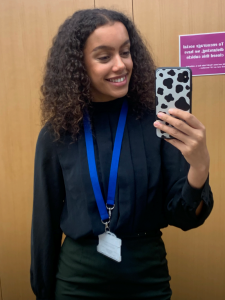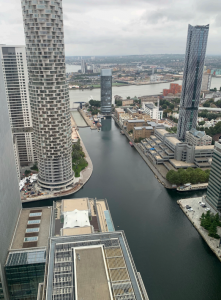 Produced by Guest blogger
Produced by Guest blogger
This is a guest blog written by BU graduate Kelseigh Hall about her experience on our MSc Investigative Forensic Psychology course and how it has helped her to achieve her career goals.
My course and life at BU
The MSc Investigative Forensic Psychology course covered a range of topics, not only content specifically related to investigative forensic psychology but also many transferable skills to help individuals in any career path. For example, the advanced research methods and advanced statistics units. I found both of these modules particularly useful.
During my time at Bournemouth University, I was a part of the dance society, competing on both the ballet and jazz teams. Representing Bournemouth University was a highlight of my year, I not only enjoyed the weekly classes and competitions, but I also attended the weekly socials which allowed me to make plenty of friends and enhance my experience at university.
Why did I choose this course?
Being a detective was always my career goal, therefore this Master’s degree appealed to me a lot. I thoroughly enjoyed the course. My favourite unit was forensic perspectives in face-processing, this topic covered how facial processing research can enhance victim and witness recall of suspect’s appearance. I had never studied face-processing before, but I enjoyed this topic so much that I decided to write my dissertation on face processing. The sophisticated eye tracking equipment available at Bournemouth University allowed me to explore this unique research area in depth.
What I learnt on the degree and how it prepared me for my career
There are many skills that will aid me in being a detective that I developed throughout the course of this degree. For example, this course provided me with an understanding of how serious complex crimes are investigated, including the different agencies responsible for these investigations and the methods they use. This course also provided me with the ability to carry out an in-depth offender profile, using psychology research to make backed up inferences about offenders, which in the real-world assists police to narrow their search. This course gave me an understanding of interviewing techniques and how to alter these techniques based on the individual. The unit on court skills I found particularly useful as it allowed me to understand courtroom skills and have the ability to write an expert witness report.
My current role and future plans
I decided to apply for the degree holder entry programme for Detective Constables with the Metropolitan Police Service in 2019. This programme appealed to me as it allowed a direct route to the role of Detective Constable without having to have experience in a uniform role. I love this job and working with the MET allows for so many opportunities to do different things and work with experienced officers who provide us with so much knowledge and advice. The MET have not only pushed us to do our best in this programme but have supported us throughout. After my initial training, I look forward to investigating serious complex crimes in the MET. I would recommend anyone who has an interest in policing to visit the MET career website.


 How BU encourages students to follow their career prospects
How BU encourages students to follow their career prospects








